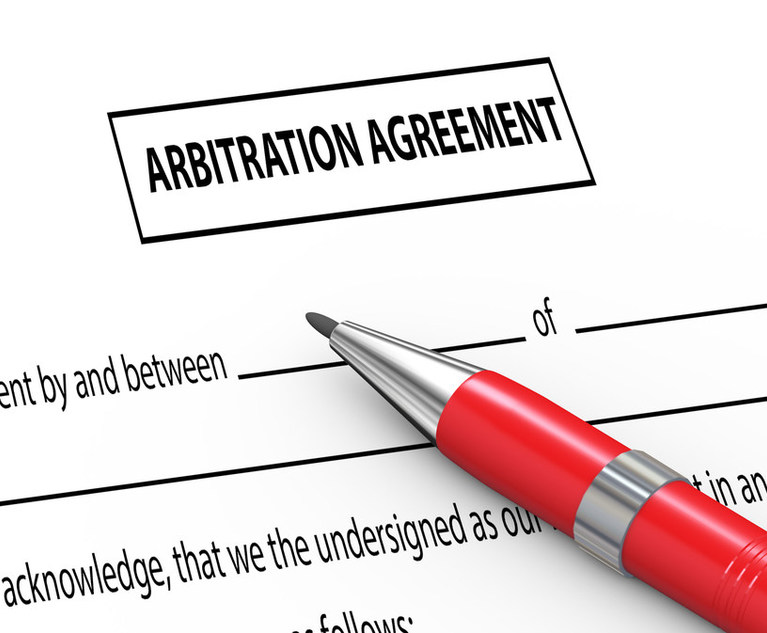Are Procedural Rights Under Title VII and Other Antidiscrimination Laws Modifiable or Waivable Outside of an Arbitration Agreement?
Are statutory procedural rights generally waivable by contract outside of arbitration? The Second Circuit's recent decision in 'Estle v. International Business Machines' suggests they may be.
February 09, 2022 at 12:00 PM
7 minute read
 When Congress enacts a civil rights law or other statute regulating employment decisions, it does so to set minimum terms that cannot be overridden or even modified by contracts between employers and employees, on the view that baseline rights must be statutorily established to protect employees or advance other polices. Arbitration agreements covered by the Federal Arbitration Act, 9 U.S.C. §1 et seq., are an exception, but only with respect to matters like the right to a jury trial which are considered incompatible with arbitration, a non-court process. The Supreme Court in 14 Penn Plaza v. Pyett, 556 U.S. 247, 259 (2009), stated a different rationale for sustaining such waivers—that the right to initially resort to a judicial forum was a procedural right, not a waiver of substantive protections which would remain preserved in arbitration. 14 Penn Plaza itself involved an arbitration clause in a collective-bargaining agreement (CBA), so it remained unclear whether statutory procedural rights are generally waivable by contract outside of arbitration. The Second Circuit's recent decision in Estle v. International Business Machines, No. 20-3372, 2022 U.S. App. LEXIS 1610 (Jan. 20, 2022) (Estle), treating the language in Pyett as holding, suggests they may be.
When Congress enacts a civil rights law or other statute regulating employment decisions, it does so to set minimum terms that cannot be overridden or even modified by contracts between employers and employees, on the view that baseline rights must be statutorily established to protect employees or advance other polices. Arbitration agreements covered by the Federal Arbitration Act, 9 U.S.C. §1 et seq., are an exception, but only with respect to matters like the right to a jury trial which are considered incompatible with arbitration, a non-court process. The Supreme Court in 14 Penn Plaza v. Pyett, 556 U.S. 247, 259 (2009), stated a different rationale for sustaining such waivers—that the right to initially resort to a judicial forum was a procedural right, not a waiver of substantive protections which would remain preserved in arbitration. 14 Penn Plaza itself involved an arbitration clause in a collective-bargaining agreement (CBA), so it remained unclear whether statutory procedural rights are generally waivable by contract outside of arbitration. The Second Circuit's recent decision in Estle v. International Business Machines, No. 20-3372, 2022 U.S. App. LEXIS 1610 (Jan. 20, 2022) (Estle), treating the language in Pyett as holding, suggests they may be.
The plaintiffs in Estle were all above age 55 when IBM terminated their employment as part of a reduction in force in May of 2016. They each signed a separation agreement containing a mandatory arbitration clause and a collective action waiver as a condition of receiving post-termination benefits, including one month's salary and health insurance for up to twelve months. The collective action waiver stipulated that "no covered claims may be initiated, maintained, heard, or determined on a multiparty, class action basis or collective action basis either in court or in arbitration." Id. at *4. Under the agreement, the former employees were not "entitled to serve or participate as a class action member or representative, or collective action member or representative, or receive any recovery from a class or collective action involving covered claims either in court or arbitration."
After signing IBM's separation agreement, the plaintiffs claimed they learned of evidence that IBM was using reductions in force "to accomplish systemic age discrimination." On March 27, 2019, the plaintiffs filed an Age Discrimination in Employment Act (ADEA), 29 U.S.C. §621 et seq., collective action against IBM in the Southern District of New York seeking, inter alia, "a declaration that the collective action waiver is invalid under the ADEA and an injunction barring IBM from enforcing the waiver against the plaintiffs." Estle, at *4. Plaintiffs then amended their complaint to challenge the entire separation agreement on Aug. 9, 2019, to "be permitted to pursue their age discrimination claims collectively, either in arbitration or in court." Appellant's Br. 3. IBM moved to dismiss for failure to state a claim under Federal Rule 12(b)(6), arguing that its collective-action waiver was valid because the right to bring a collective action is a "procedural device to join claims," not a substantive right covered by the ADEA's waiver prohibition.
This content has been archived. It is available through our partners, LexisNexis® and Bloomberg Law.
To view this content, please continue to their sites.
Not a Lexis Subscriber?
Subscribe Now
Not a Bloomberg Law Subscriber?
Subscribe Now
NOT FOR REPRINT
© 2025 ALM Global, LLC, All Rights Reserved. Request academic re-use from www.copyright.com. All other uses, submit a request to [email protected]. For more information visit Asset & Logo Licensing.
You Might Like
View All


Deal Watch: Private Equity Dealmakers Make 2025 Predictions Amid Deal Resurgence
12 minute readTrending Stories
- 1Does the Treasury Hack Underscore a Big Problem for the Private Sector?
- 2Gen AI Legal Tech Startup Eve Raises $47 Million Series A Investment
- 3Hicks Johnson Promotes Lori Arakaki and Daniel Scime to Firm Partnership
- 4Buchalter Opens in Chicago With 25 Lawyers, Staff
- 5Assessing the Second Trump Presidency’s Impact on College Sports
Who Got The Work
J. Brugh Lower of Gibbons has entered an appearance for industrial equipment supplier Devco Corporation in a pending trademark infringement lawsuit. The suit, accusing the defendant of selling knock-off Graco products, was filed Dec. 18 in New Jersey District Court by Rivkin Radler on behalf of Graco Inc. and Graco Minnesota. The case, assigned to U.S. District Judge Zahid N. Quraishi, is 3:24-cv-11294, Graco Inc. et al v. Devco Corporation.
Who Got The Work
Rebecca Maller-Stein and Kent A. Yalowitz of Arnold & Porter Kaye Scholer have entered their appearances for Hanaco Venture Capital and its executives, Lior Prosor and David Frankel, in a pending securities lawsuit. The action, filed on Dec. 24 in New York Southern District Court by Zell, Aron & Co. on behalf of Goldeneye Advisors, accuses the defendants of negligently and fraudulently managing the plaintiff's $1 million investment. The case, assigned to U.S. District Judge Vernon S. Broderick, is 1:24-cv-09918, Goldeneye Advisors, LLC v. Hanaco Venture Capital, Ltd. et al.
Who Got The Work
Attorneys from A&O Shearman has stepped in as defense counsel for Toronto-Dominion Bank and other defendants in a pending securities class action. The suit, filed Dec. 11 in New York Southern District Court by Bleichmar Fonti & Auld, accuses the defendants of concealing the bank's 'pervasive' deficiencies in regards to its compliance with the Bank Secrecy Act and the quality of its anti-money laundering controls. The case, assigned to U.S. District Judge Arun Subramanian, is 1:24-cv-09445, Gonzalez v. The Toronto-Dominion Bank et al.
Who Got The Work
Crown Castle International, a Pennsylvania company providing shared communications infrastructure, has turned to Luke D. Wolf of Gordon Rees Scully Mansukhani to fend off a pending breach-of-contract lawsuit. The court action, filed Nov. 25 in Michigan Eastern District Court by Hooper Hathaway PC on behalf of The Town Residences LLC, accuses Crown Castle of failing to transfer approximately $30,000 in utility payments from T-Mobile in breach of a roof-top lease and assignment agreement. The case, assigned to U.S. District Judge Susan K. Declercq, is 2:24-cv-13131, The Town Residences LLC v. T-Mobile US, Inc. et al.
Who Got The Work
Wilfred P. Coronato and Daniel M. Schwartz of McCarter & English have stepped in as defense counsel to Electrolux Home Products Inc. in a pending product liability lawsuit. The court action, filed Nov. 26 in New York Eastern District Court by Poulos Lopiccolo PC and Nagel Rice LLP on behalf of David Stern, alleges that the defendant's refrigerators’ drawers and shelving repeatedly break and fall apart within months after purchase. The case, assigned to U.S. District Judge Joan M. Azrack, is 2:24-cv-08204, Stern v. Electrolux Home Products, Inc.
Featured Firms
Law Offices of Gary Martin Hays & Associates, P.C.
(470) 294-1674
Law Offices of Mark E. Salomone
(857) 444-6468
Smith & Hassler
(713) 739-1250







